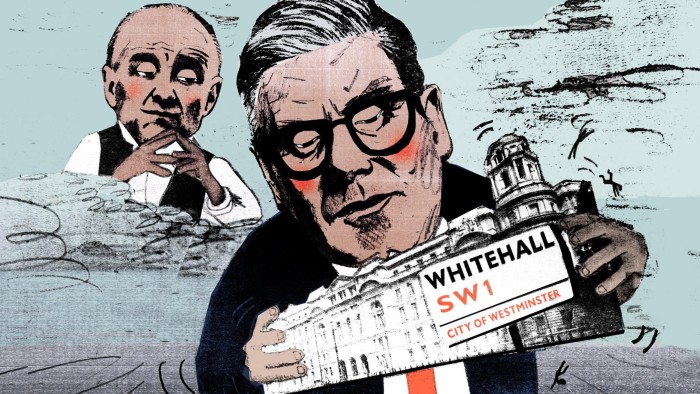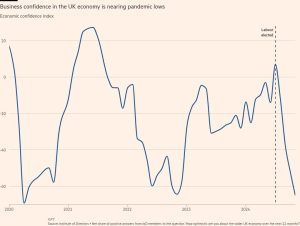Keir Starmer and the Cummings consensus

Unlock the Editor’s Digest for free
Roula Khalaf, Editor of the FT, selects her favourite stories in this weekly newsletter.
So Dominic Cummings was right after all, at least in his own dispassionate analysis. Boris Johnson’s chief strategist proclaimed his vindication after Keir Starmer echoed his indictments of civil service failures. There ought to be a name for this new consensus. Darmerism, anyone?
And yet the Sage of Specsavers has at least a partial point. It is striking to tally up the areas of Starmer’s alignment with his Tory predecessors. For all their ideological differences, Labour appears to share much of the Cummings/Boris Johnson diagnosis of why the UK does not function as it should.
This is not to indulge the facile claims that there are no major philosophical differences between the two main parties. It is hard to imagine, for example, the Conservatives introducing higher payroll taxes for employers at the levels in Rachel Reeves’ Budget, although their unaffordable tax-cutting before the election was certainly boosted by the knowledge they would not be around to face the consequences.
But there are large areas of consensus. Last week the prime minister berated civil servants for too often relaxing in the “tepid bath of managed decline”. Four days later his cabinet office minister and senior lieutenant, Pat McFadden, declared that Whitehall had to learn new ways and attract more expertise. This second speech revived memories of a similar if more flamboyant lecture by Michael Gove in the early days of the Johnson government.
Thursday saw the first tranche of Labour’s planning reforms, which aim to break the regulatory logjam holding back housebuilding and infrastructure. At its core are centrally mandated housing targets — something else Cummings and Johnson proposed, only to see it scuppered by their own MPs frightened of a local backlash. Labour has even agreed to rethink environmental safeguards stopping developments that pollute rivers, a move it fought in opposition.
On environmental rules, Starmer’s speech last week contained a lengthy assault on the “absurd spectacle” of the £100mn bat tunnel holding up HS2, the country’s largest infrastructure project. Allies say Starmer also displays general Johnsonian impatience with other regulators who he sees as obstacles to growth.
Alongside planning, Labour has also picked up and gone further with pension reforms begun by the Tories under Jeremy Hunt, to create new superfunds which can be cajoled or possibly coerced into investing more in UK infrastructure or business. One can also add welfare reform and further devolution to the areas of common purpose.
But consensus is not enough. Cummings may claim vindication but the Tories fell short of their rhetoric. If Starmer is following their path, he needs to learn why. The first reason is that reform is not delivered by declamation. It is slow, detailed and difficult. The Cummings managerial style did not match his analytical skills — ultimately he could not even build a coalition with his own boss. His hit lists, threats and hyperbole simply created the sense of a political vendetta. Others, like Gove, lost focus with generalised attacks on “the blob”.
It is dangerous to invest too heavily in the idea of government as a start-up. Agile work processes are effective for new and discrete projects, but organisations whose decisions affect millions of lives cannot “move fast and break things”. McFadden instead evangelised small-scale pilot projects but this is a slow route for a government in a hurry. Whitehall reform must also ultimately mean taming the often-obstructive Treasury.
Finally, politics incentivises those out of power to oppose even measures which they know make sense. The primary challenge of planning reform to deliver both homes and infrastructure (prisons, rail lines, nuclear power stations) has been opportunistic opposition parties seeking electoral benefits from playing the Nimby card.
So the planning reforms will be a major test of Starmer’s resolve. Facing down both nature campaigners and doubters among its own MPs and councillors is essential if Labour is to get anywhere near its already ambitious target of 1.5mn new homes this parliament.
And Starmer’s first months have not built confidence in his ability to take on the machine. The most successful reforms have come from ministers, like Gove or David Blunkett at education, who reached office with clear intent and who eschewed big bang change in favour of grappling with manageable problems one at a time. Labour arrived unprepared and with too little of its agenda worked through in detail. Essential reforms, not least of the NHS, are drifting into next year — doubly worrying since it can take years for the effects to be felt.
Critics also question Starmer’s choice of Chris Wormald, a Whitehall lifer and consummate insider, as the new cabinet secretary. Starmer’s allies worry that failure to follow through will lead voters to turn to political disrupters like Nigel Farage and those Tories increasingly taken with Argentina’s maverick libertarian president Javier Milei.
The worry for allies is that Starmer’s government will be just the latest example of the ever decreasing circle in which mainstream parties can see what change is needed, but are unable to drive it through. One more instance of a politics that wills the end but cannot find the means.
#Keir #Starmer #Cummings #consensus





